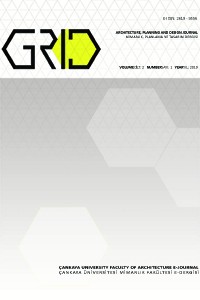Öz
To think authenticity, the cultural
identity and social economic and environmental sustainability is to reflect on
the values and actions that must be developed to strengthen the identity of
the regions. They are inseparable components with an impact on the organization
of the territory and architecture that affect everyday life and the means and
modes of production. To avoid the destruction of secular structures of
territorial organization, it is necessary to have a critical awareness of the
heritage, to question the cultural values and the symbolic contents that
define the ways of being of the populations. Action strategies have been
creating tourism networks, rebuilding constructions. We only see effects of a
formal contaminated recovery process. Intervention methodologies have to create
dynamics that make regions attractive to live, providing quality of life and
meaning to the collective future. As case study on rehabilitation in vernacular
architecture we present Outeiro da Vinha,
Portugal.
Anahtar Kelimeler
authenticity heritage vernacular architecture architectural rehabilitation
Kaynakça
- Braungart, M., McDonoug, W. (2009). Cradle to Cradle Remaking the Way We Make Things. London: Vintage Books.
- Duarte, F. (2002). Crise das Matrizes Espaciais. São Paulo: Editora Perspectiva S. A.
- Duarte, R., Pinheiro, A.P. (2017). Apocalipse Online. Casal de Cambra: Caleidoscópio Edição e Artes Gráficas, S.A.
- Duarte, R., Pinheiro, A.P. (2009). The Power of Idea. 1st edition. Lisbon: Insidecity.
- Miranda, J., 2015. Arquitetura, Património e Autenticidade, Autenticidade na reabilitação do Património Histórico. PhD. Lisbon School of Architecture, University of Lisbon.
- Pinheiro, A.P., 2017. Reabilitação Arquitectónica, Sustentabilidade e Design. PhD. Lisbon School of Architecture, University of Lisbon.
- Ribeiro, O. (1967). PORTUGAL O mediterrâneo e o Atlântico. 3rd edition. Lisbon: Livraria Sá da Costa Editora.
- Rebelo, S. (2018). Red gold from Douro valley, Blog Salt of Portugal, 20 August.
- Távora, F., Pimentel,R., Menéres, A., Filgueiras, O., Araújo, A., Dias, C., Amaral, F., Lobo, J., Malato, J., Pereira, N., Freitas, A., Dias, F., George, F., Gomes, A., Antunes, A., Martins, A., and Castro, C., Torres, F. (1980). Arquitetura Popular em Portugal. 2nd Edition. Lisbon: Associação dos Arquitectos Portugueses.Teixeira, M. (2016). Popular Architecture, Archinews 06, Year X, Special Edition.
- The Burra Charter. 1999. https://australia.icomos.org/wp-content/uploads/The-Burra-Charter-2013-Adopted-31.10.2013.pdf [Accessed November 2018].
- The Charter on the Built Vernacular Heritage. 1999. https://www.icomos.org/images/DOCUMENTS/Charters/vernacular_e.pdf [Accessed November 2018].
- The Charter of Machu Picchu. 1977. http://orcp.hustoj.com/wp-content/uploads/2015/12/1977-The-Charter-of-Machu-Picchu.pdf [Accessed November 2018].
- The Nara Document on Authenticity. 1994. http://orcp.hustoj.com/2016/01/17/nara-document-on-authenticity-1994/ [Accessed November 2018].
Öz
Kaynakça
- Braungart, M., McDonoug, W. (2009). Cradle to Cradle Remaking the Way We Make Things. London: Vintage Books.
- Duarte, F. (2002). Crise das Matrizes Espaciais. São Paulo: Editora Perspectiva S. A.
- Duarte, R., Pinheiro, A.P. (2017). Apocalipse Online. Casal de Cambra: Caleidoscópio Edição e Artes Gráficas, S.A.
- Duarte, R., Pinheiro, A.P. (2009). The Power of Idea. 1st edition. Lisbon: Insidecity.
- Miranda, J., 2015. Arquitetura, Património e Autenticidade, Autenticidade na reabilitação do Património Histórico. PhD. Lisbon School of Architecture, University of Lisbon.
- Pinheiro, A.P., 2017. Reabilitação Arquitectónica, Sustentabilidade e Design. PhD. Lisbon School of Architecture, University of Lisbon.
- Ribeiro, O. (1967). PORTUGAL O mediterrâneo e o Atlântico. 3rd edition. Lisbon: Livraria Sá da Costa Editora.
- Rebelo, S. (2018). Red gold from Douro valley, Blog Salt of Portugal, 20 August.
- Távora, F., Pimentel,R., Menéres, A., Filgueiras, O., Araújo, A., Dias, C., Amaral, F., Lobo, J., Malato, J., Pereira, N., Freitas, A., Dias, F., George, F., Gomes, A., Antunes, A., Martins, A., and Castro, C., Torres, F. (1980). Arquitetura Popular em Portugal. 2nd Edition. Lisbon: Associação dos Arquitectos Portugueses.Teixeira, M. (2016). Popular Architecture, Archinews 06, Year X, Special Edition.
- The Burra Charter. 1999. https://australia.icomos.org/wp-content/uploads/The-Burra-Charter-2013-Adopted-31.10.2013.pdf [Accessed November 2018].
- The Charter on the Built Vernacular Heritage. 1999. https://www.icomos.org/images/DOCUMENTS/Charters/vernacular_e.pdf [Accessed November 2018].
- The Charter of Machu Picchu. 1977. http://orcp.hustoj.com/wp-content/uploads/2015/12/1977-The-Charter-of-Machu-Picchu.pdf [Accessed November 2018].
- The Nara Document on Authenticity. 1994. http://orcp.hustoj.com/2016/01/17/nara-document-on-authenticity-1994/ [Accessed November 2018].
Ayrıntılar
| Birincil Dil | İngilizce |
|---|---|
| Konular | Mimarlık |
| Bölüm | Araştırma Makaleleri |
| Yazarlar | |
| Yayımlanma Tarihi | 15 Ocak 2019 |
| Gönderilme Tarihi | 2 Aralık 2018 |
| Yayımlandığı Sayı | Yıl 2019 Cilt: 2 Sayı: 1 |


